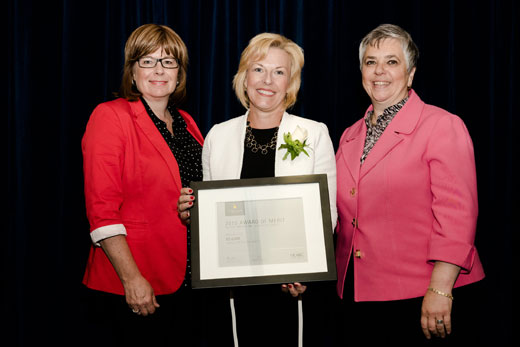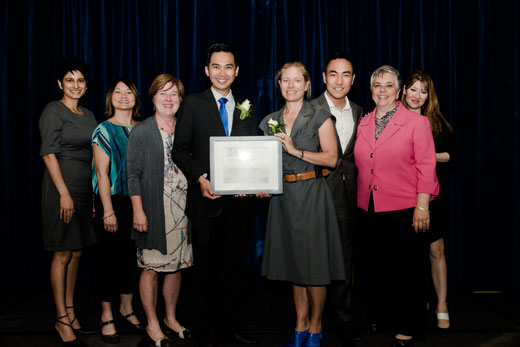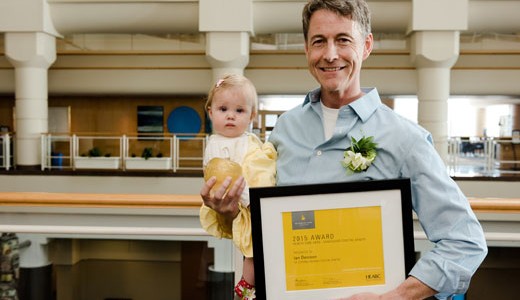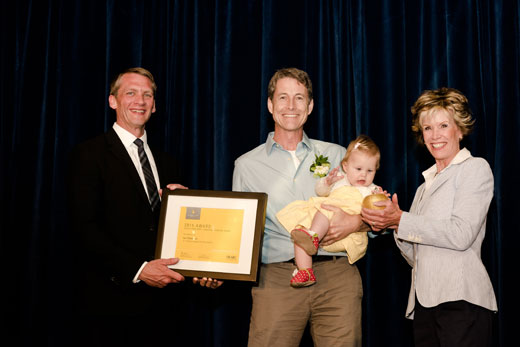HEABC Awards recognize excellence in Vancouver
VCH-Vancouver walked away from the 9th Annual Excellence in BC Health Care Awards on Monday with personal and project accolades.
While Ian Denison was awarded a Gold Apple and the coveted Health Care Hero Award for his unwavering commitment to the patients of GF Strong and for advancing the field of physiotherapy, Susan Seeman and the ED iCARE Team at VGH were honoured with an award for their innovative work in helping frail elders return and remain home safely following an ED visit.
But wait — there’s more!
Our very own Tim Lau, on behalf of the ASPIRES team, accepted an award for the group’s collective efforts and collaboration to enhance the treatment of infections at VGH, as well as at our VCH Lions Gate and Richmond Hospitals.
For our winners’ stories and a video featuring our very own Health Care Hero Ian Denison, keep on reading.
Ian Denison, our Health Care Hero
Ian Denison is known as the person who “carries the history of GFS.” With the exception of two six-month job exchanges, Ian has spent his entire career — since 1980 — at our GF Strong Rehabilitation Centre, where he has developed a reputation for going the distance to improve the lives of people recovering from injury and living with disabilities. The ATP equipment specialist is also known for boosting morale by organizing regular and ongoing activities outside of work, including staff picnics, the popular lunchtime activity Ring the Stick, volunteer teaching amputee and paralyzed skiers how to use outriggers and mono skis, and volunteering in Haiti to help disabled children.
“During his time at GF Strong, Ian has consistently gone out of his way to improve the lives of those around him both within his job description and in extracurricular ways,” wrote Karin Alzner, administrative secretary for GF Strong’s patient services managers. “Ian’s dedication and passion to assisting patients and fellow staff continue to exemplify the tradition of excellence that GF Strong has been known for for many years. People like Ian make us proud to be a part of the GF Strong experience.”
Congratulations, Ian! Your work over the last 35 years has made a difference to people trying to return to regular living after life-changing spinal, brain, neuromuscular and arthritis illness.
For Ian Denison’s full story, watch the HEABC video:
Susan Seeman and the ED iCARE team: Top Innovation

Innovation rewarded: Susan Seeman (centre) shared the ED iCARE team’s time in the spotlight with Shannon Hopkins and Vivian Eliopoulos.
“It really is a partnership between the Emergency Department and community staff coming together to do the best thing for patients,” says Susan Seeman, director, strategic initiatives, and recipient of the Top Innovation Award of Merit.
Referring to the combined team effort behind ED iCARE, an innovative solution that helps frail seniors 70 years and older return — and remain — home following an ED visit, Susan highlights the benefits to patients.
“With the appropriate supports, home is the safest place for these patients to recover from illness or injury, and manage their chronic conditions. In hospital, frail elders with chronic conditions are at higher risk for falls, delirium, and infections.
“There’s also the risk of these patients becoming overmedicated or deconditioned because they are kept in bed too long,” she explains. “So, we decided to build on our Home is Best philosophy to provide timely and appropriate community supports and return more seniors to the comfort of their own home to recover, where they will have the best chance to regain their strength and independence. Not only is this providing quality care for seniors, we’re also creating capacity for patients who require in-hospital care and easing ED congestion.”
Standardized assessment and care planning, improved discharge planning, and enhanced transitions and care coordination are essential for success. And for every patient who returns home safely, many individuals make meaningful contributions.
Susan credits the frontline ED iCARE team — care management leaders, ED interprofessionals (physio, social workers, physicians, RNs, pharmacists), transition services coordinators, the Quick Response Team (community RNs, OTs, physicians), Older Adult community teams and community GPs — for the program’s achievements.
Dr. John Sloan, a QRT physician, says he’s seen a paradigm shift in how ED physicians think. “I think the biggest change for seniors has been a cultural change among ED physicians to consider exploring alternate strategies, when in the past a patient would’ve been admitted.”
Donna Love, a QRT RN, sees immediate returns on a daily basis — the joy on her clients’ faces.
“Most are quite excited about being able to go home,” says Donna, “because they had it in their heads they wouldn’t be able to, especially those with fractures or pain management issues. When we tell them there’s a way we can get them home safely and be cared for properly there, most are so happy to hear that.”
Since launching ED iCARE in 2014, an additional two patients are returning home from the ED every day — the equivalent of 22 inpatient beds, or an entire medical unit, saved on a daily basis.
Susan is extremely proud of the ED iCARE team and delighted to be recognized by her health care peers. But it goes beyond that.
“For me personally, it has been very rewarding to see frail elders return to the comfort of their homes with the right kind of care that they need, the way I would want care provided for my own mom and dad.”
Watch our video — Home is Best: Leo’s Story — to see members of the Quick Response Team in action:
Dr. Tim Lau and the ASPIRES team: Collaborative Solutions

The ASPIRES team (l to r): Dr. Daljit Ghag, Felicia Laing, Dr. Elizabeth Bryce, Dr. Tim Lau, Dr. Jennifer Grant, Dr. Titus Wong, Vivian Eliopoulos, and Salomeh Shajari. Missing: Drs. Nilu Partovi, William Bowie, Diane Roscoe and Patrick O’Connor, and Linda Dempster, former VCH executive director of quality and patient safety.
Meet Dr. Tim Lau, an infectious disease pharmacist, and Dr. Jennifer Grant, an infectious diseases physician/medical microbiologist. As project leads for the ASPIRES team — the Antimicrobial Stewardship Program: Innovation, Research, Education & Safety team — they share the HEABC Collaborative Solutions Award with a region-wide group of dedicated professionals.
ASPIRES, part of the Four Cornerstones regional initiative to reduce health care-associated infections, launched three years ago to educate clinicians on how to optimize antimicrobial use to improve patient care.
“One of our most important medical challenges is maintaining the efficacy of antibiotics — not just for people with infections, but for those whose immune systems are compromised for necessary medical care,” says Jennifer.
“Without antibiotics, many forms of chemotherapy, immunotherapy and care of newborns would not be possible, or successful. I’m hoping that if we’re careful, we can keep doing the things that we do to make people live longer, happier lives.”
ASPIRES uses a multi-faceted approach that includes pocket references, pre-printed orders to guide treatments, online intranet resources and educational in-service sessions (e.g. Grand Rounds). Its most effective strategy, however, is “prospective audit and feedback” discussions.
Tim and Jennifer, as well as Drs. Daljit Ghag and Titus Wong, review patients who are on target microbial therapies and then sit down with physicians and pharmacists to discuss the rationale behind their choice of prescriptions while also reviewing culture and lab results.
“Then we provide input where there are opportunities to optimize treatments,” says Tim. “This allows us to tailor our recommendations for their practice, which over time, encourages good prescribing practices and better targeted interventions.”
Since launching its audit and feedback program in August 2013, ASPIRES has recommended interventions on 1,226 patients with an acceptance rate of 78 per cent at VGH.
“This has resulted in 2,980 avoided days of antibiotic therapy on our targeted medical services,” says Tim. “Since the launch of the C. difficile infection (CDI) quality assurance initiative in collaboration with Infection Control and Four Cornerstones, 99 per cent of CDI-positive patients are now followed by a clinical pharmacist to ensure treatments are optimized. Overall, we’ve seen a reduction in broad-spectrum and targeted intravenous antibiotics usage.”
Similar interventions have been initiated at Lions Gate Hospital, where Dr. Gabe Loh and Isla Drummond have intervened on 266 patients since October 2013, and at Richmond Hospital, where Drs. Jerry Vortel and Sandra Chang have intervened on 127 since April 2014.
VGH clinical nurse educator Doris Bohl has nothing but praise for ASPIRES. She and the nursing staff on Sub Acute Medicine (CP7) and the Acute Hospitalist Medical Unit (CP 10 D) were part of the first group to implement the ASPIRES urinary tract infection (UTI) management algorithm to reduce UTIs caused by indwelling Foley catheters.
“All I can say is thank you ASPIRES for developing this algorithm,” says Doris. “It’s made a big difference in how we care for our patients.”
Tim says receiving this award is a huge honour.
“It’s a great feeling to know that our efforts are recognized as an important initiative. More importantly, our accomplishments are the result of the hard work by all our clinicians, as they’re the ones who are most responsible for optimizing antimicrobial prescribing and patient outcomes, so this is actually an award to acknowledge their achievements in improving patient care,” he says.




